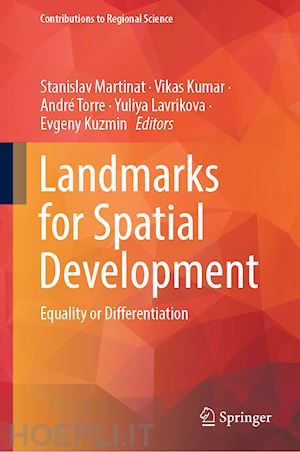
Questo prodotto usufruisce delle SPEDIZIONI GRATIS
selezionando l'opzione Corriere Veloce in fase di ordine.
Pagabile anche con Carta della cultura giovani e del merito, 18App Bonus Cultura e Carta del Docente
The book explores the uneven spatial distribution of territory resources and its implication for the sustainable development of regions and cities. The authors analyze the features of the localization of assets, paying attention to both the manifested factors and the conditions that determine the specificity of the current spatial organization. On the basis of multivariate analysis, gravity models, clustering method, as well as the evaluation of concentration parameters, the authors propose various approaches to systematize territorial units, paying special attention to the peculiarities of their economic structure, resource diffusion barriers, and quality of life parameters. The obtained results indicate the need for a differentiated approach in the choice of guidelines for the transformation of the socio-economic space, allowing the researchers to propose various transformation models for differing regions. Thus, this book presents spatial organization models for different regional economies, highlighting various approaches to achieving the Sustainable Development Goals and reducing inequality.
The book seeks to balance the benefits of polarized development with the need to avoid significant interregional disparities. At the same time, the book offers various solutions for differentiating territories, distinguishing different spatial elements, and determining the most appropriate transformation options. The results obtained may be of interest to scholars in regional and spatial science as well as to professionals in the field of territorial development management.
Stanislav Martinat is a researcher, a human geographer, currently working in the Social, Economic and Geographical Sciences Department at The James Hutton Institute (UK) and at the Department of Environmental Geography, Institute of Geonics, Czech Academy of Sciences. His previous positions involve Cardiff University (School of Geography and Planning), Aston University (Energy and Bioproduct Research Institute), and Arizona State University (School of Geographical Sciences and Urban Planning). He was awarded by Fulbiright Fellowship (2016-2017) and MSCA Co-fund Fellowship (2018-2020).
Vikas Kumar is an associate dean for Research, Innovation and Enterprise and a professor of Operations and Supply Chain Management at the Faculty of Business, Law and Social Sciences, Birmingham City University, Birmingham, UK. He serves on the editorial board of several international journals, including International Journal of Physical Distribution and Logistics Management, the Journal of Business Logistics, International Journal of Mathematical, Engineering and Management, and International Journal of Supply Chain and Operations Resilience.
André Torre is the research director at France's National Institute for Agricultural Research (INRA), works at AgroParisTech, and heads the Paris-Saclay Humanities and Social Sciences Center (MSH Paris-Saclay). By virtue of his research in the social sciences, poised at the intersection of industrial and spatial economics, he has made a name for himself as an expert on territorial development from the standpoint of proximity and territorial conflicts. His other job is at Paris-Saclay, where he has directed the Humanities and Social Sciences Center (MSH Paris-Saclay) since 2018.
Yuliya Lavrikova is the director of the Institute of Economics of the Ural Branch of the Russian Academy of Sciences. She is a member of the international Eurasian business and economic community (USA, Netherlands, Turkey), the Association of Russian geographers and social scientists.
Evgeny Kuzmin is the researcher in the Department of Regional Economic Policy and Economic Security at the Institute of Economics at the Ural Branch of the Russian Academy of Sciences. He is a reviewer of high impact international journals including Journal of Cleaner Production (Elsevier), Entrepreneurship and Sustainability Issues, etc. He has over 150 published scientific papers.










Il sito utilizza cookie ed altri strumenti di tracciamento che raccolgono informazioni dal dispositivo dell’utente. Oltre ai cookie tecnici ed analitici aggregati, strettamente necessari per il funzionamento di questo sito web, previo consenso dell’utente possono essere installati cookie di profilazione e marketing e cookie dei social media. Cliccando su “Accetto tutti i cookie” saranno attivate tutte le categorie di cookie. Per accettare solo deterninate categorie di cookie, cliccare invece su “Impostazioni cookie”. Chiudendo il banner o continuando a navigare saranno installati solo cookie tecnici. Per maggiori dettagli, consultare la Cookie Policy.